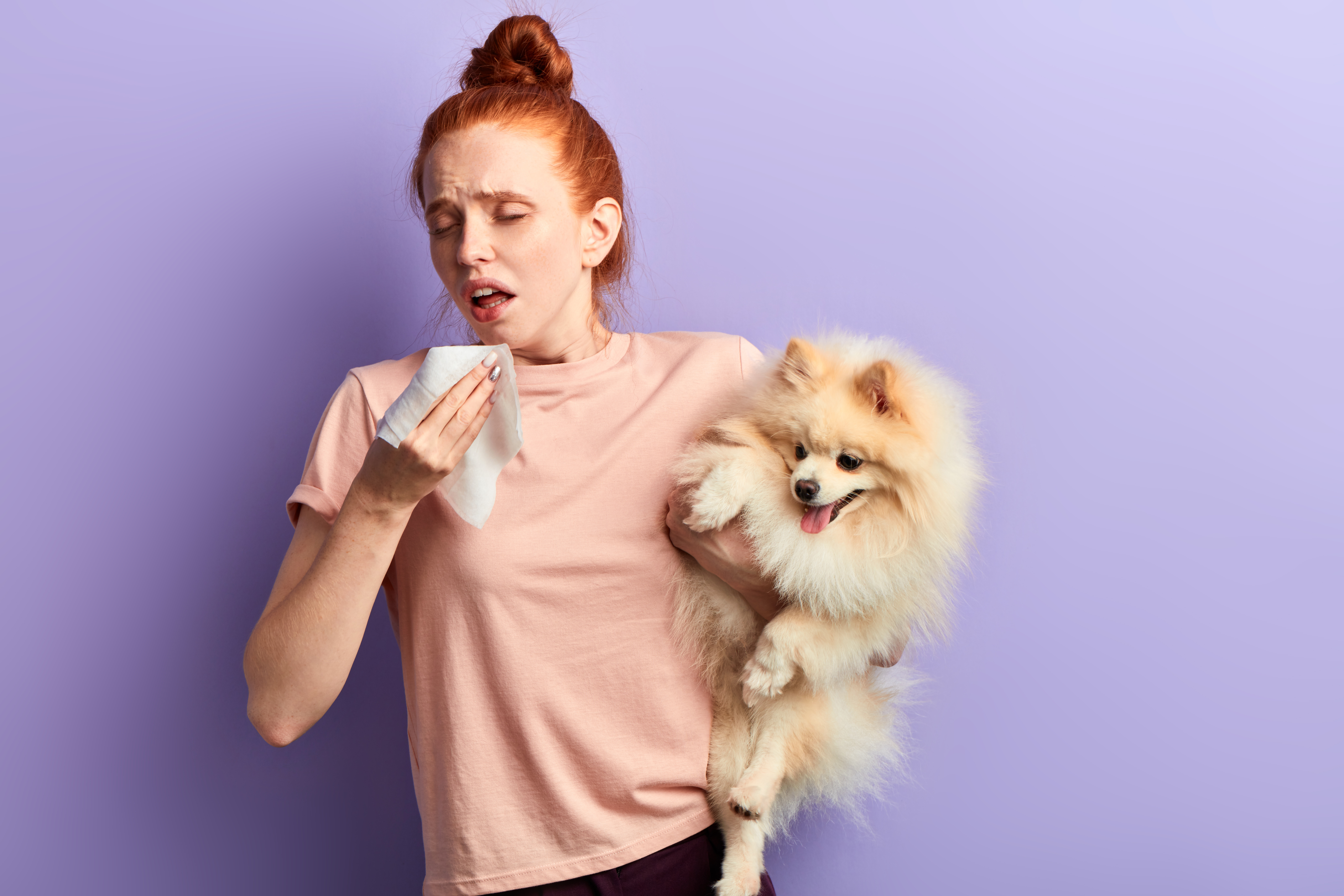LifeWithMyDogs is supported by our audience. When you purchase through one of our links, we may earn a small affiliate commission. As an Amazon Associate I earn from qualifying purchases. Your cost is not affected.
**********
Take Time To Study Pet Allergy Solutions
It is important to address and overcome pet allergies. Allergic reactions happen to humans and animals. These occur due to the immune responses of both from exposure to allergens. These reactions are natural but may sometimes be troublesome or even dangerous.
Know Why and How Allergies Happen
Many believe that allergic reactions are there to help out. The body displays certain symptoms as its way to take out or defend itself from the threats it perceives. This is why folks who experience allergic reactions cough, sneeze, or wheeze sometimes. It’s the same for our four-legged friends.

Man and domesticated animals release histamines in the body during an allergy. These hormones cause a variety of symptoms to surface. In some cases, an emergency called anaphylaxis happens. This is why it is important to know the best treatment for pet allergies.
Start With The Assessment To Overcome Pet Allergies
Ocular inspection is almost always the first step. Touching the surface of the skin may also help to examine the temperature. These may help to assess the presence or severity of an allergy or determine what’s going on. They could also point out the appropriate ways to beat pet allergies.
Blood testing for humans and animals are also available to diagnose allergies. These are accessible in medical facilities. They cost money but could at least pinpoint causes and help find out the best therapies for relief.
Allergy Symptoms of Pet Owners and Pets
These are the usual indicators of allergy sufferers. Humans and animals often have mild or severe versions of these:
- Airway problems marked by sneezing, coughing, wheezing, and shortness of breath.
- Irritation as manifested by nasal congestion, facial pains, red and watery eyes, and skin rash.
- Gastrointestinal problems such as diarrhea and vomiting (often only in animals)
Know The Best Treatment For Pet Allergies
Pet owners must have a stock of over-the-counter drugs for allergic reactions. That is to have the best medication for pet allergies available. For the most part, those that help humans also work on most animals like dogs. Yet the dosages for animal treatment are often different.
There are also natural remedies pet allergies respond well to. But they are often used for prevention or mild cases of hypersensitivity. They involve self-care measures and the use of organic supplements.
Medical Approach To Overcome Pet Allergies
There are common drugs given to people and their pets for allergy relief. These are to counter histamines, leukotrienes, and prostaglandins. These medicines are to stop symptoms like inflammation, edema, and blood pressure drop. They can even help airway constriction and skin reactions.
Some examples of these are below. Seeking a physician’s advice is safer than self-medicating. Vet consultation is necessary before providing either of these to pets too. It’s because they are professionals qualified to recommend and set drug dosages.
Antihistamines
- Diphenhydramine
- Cetirizine
- Loratadine
- Clemastine
- Hydroxyzine
Antileukotrienes
- Zafirlukast
- Montelukast
- Zileuton
Bronchodilators
- Salbutamol
- Fluticasone
- Salmeterol
Notes
Know the right dosage, timing, and route of administration. Limit pet exposure too. These are important for the helpful measures to work. Yet preventing is as essential as cueing. Thus you can try immunotherapy too. That is for yourself, your fur companion, or the both of you.
Extra Notes
There are some medications that are safe for humans but not always for animals. Other drugs are also supplied at lower dosages for safety. For instance, people give saline or pediatric nasal sprays to their animal companions. That is in place of decongestants that may cause elevated heart rates and seizures. They also only supply steroids for severe inflammation or allergic reactions.
Natural Remedy For Treating Pet Allergies
Alternative medicine for allergy treatment often does not involve medical mainstream therapies. This means using non-pharmacological interventions. This involves homeopathic and naturopathic strategies for the most part.
Here are some tips on dealing with pet allergies the natural way.
Hygiene Improvement
People should take a bath at regular intervals. Whole body showers can help in preventing and dealing with allergy symptoms. Use hypoallergenic shampoo and soap as necessary.
Pet owners ought to bathe and groom their companions at least once or twice per week. These are to remove proteins that may cause allergic reactions after exposure. Baths could wash off traces of saliva, urine, and dead skin cells that has these allergens. Wiping their nose, mouth, belly, back, and paws could also help.
Make Certain Areas Pet-Free
Allergy sufferers may want to keep specific places to themselves. No pets here, for the most part. They ought to clean these areas and be thorough too. It means washing and replacing some sheets and drapes, and doing vacuum cleaning. Using a HEPA filter would be great too.
For our pets not to suffer from allergies, separate them from certain locations. These would be areas where they are prone to allergen exposure. Examples of these are spots the laundry, kitchen, garden, and where trash bins are at. It’s because these are where triggers are accessible to them. Animals could be allergic to food items, pollen, and insect bites.
Diet Modification
For Pet Owners
Going for a diet that is free of common triggers can help. That would be having one that is free of:
- nuts
- poultry
- soy
- dairy goods
- wheat
- fish
- shellfish
- gluten
For Pets
Changing what animals eat could help handle and overcome pet allergies. For this one, you may have to see what your pet is eating first and then make adjustments. Remove food items that are allergens and find substitutes for them.
Examples Of Hypoallergenic Food For Pets
- Hydrolyzed Protein. These have proteins that won’t trigger allergies in animals anymore.
- Prescription Diet Food Packs. For sensitive pets to ensure the safety of their digestion and coat.
- Hypoallergenic Meals. You may try a diet that includes venison, potato, salmon, duck, and pea.
Desensitization With Counterconditioning For Allergies
These psychological strategies may help pet owners and their fur kids overcome pet allergies. They may aid in developing immunity to allergens. It’s that or they could at least lessen allergic reactions.
Define Them
Desensitization could make a person or animal less sensitive to stimuli. This is through constant exposure to lesser versions of the triggers. The goal is to get used to the irritants. Counterconditioning aims to convert undesirable responses into positive or at least manageable ones. This can work by having contact with irritants and then having pleasing stimuli introduced. That is to have a positive association of allergens.
Their Application Together
Combine these pet allergy solutions. It may be difficult or impossible to relate triggers with pleasing things when there is an active reaction. Thus mix these techniques to the benefits of both at once.
Have exposure to weak forms of irritants first. Things associated with good emotions come right after. Yet it may take weeks or months to achieve success. Therefore, trial and error may be necessary.
In Conclusion
Allergies in humans and animals occur. Allergens become present and trigger irritation from time to time. Yet there are preventive and curative measures to deal with and overcome pet allergies. But appraisal of a situation is always first before any intervention. After that, there are options for conventional and alternative remedies to use.
Pet owners need to take time to study these things because allergies can be mild or severe. They need the knowledge and skills to respond to these well. Learning these could help one discover the best treatment for pet allergies. That is for owners and pets alike.
Read More
Treatment Of Canine Atopic Dermatitis
Survival Guide for Pet Allergies


